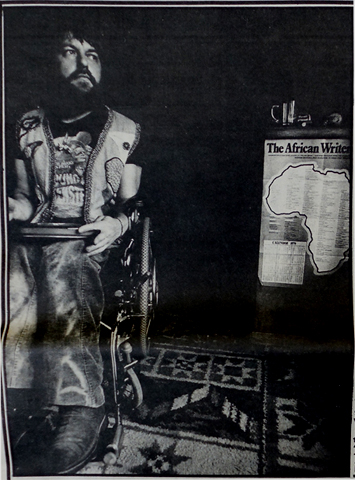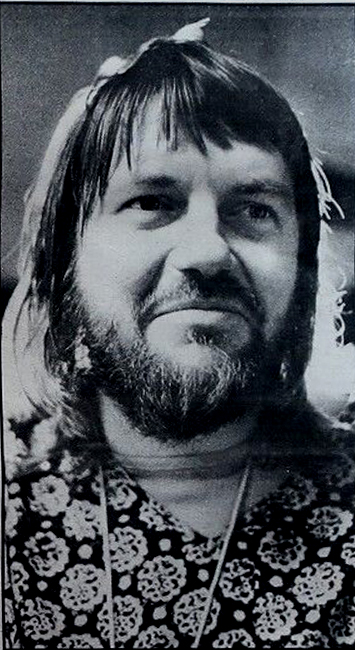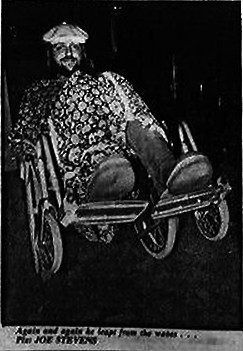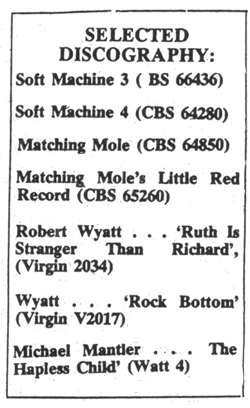| |
|
|
 The wild spume of his hair broke over my bowspirit - New Musical Express - June 26,
1976 The wild spume of his hair broke over my bowspirit - New Musical Express - June 26,
1976
 |
|
"HANG ABOUT", says Robert Wyatt, and consults his notebook. " Er - oh yes - hmm - ah, there's that ".
Whatever he's got jotted there acts like jump leads on the cortex , because abruptly Robert is off and spouting single-hitched and I'm clinging to my harpoon line and wondering will I ever see Nantucket again.
Unless the critic can put the public's money where his mouth is, he's not much use to the jazz musician." That's for starters. I'm just bracing my 'waders for a bit of a retaliatory tug on the line when the' behemoth flaps his fluke.
"Jazz history so far has been a history of white people creating that idea of a traditional, middle period and avant-garde out of an organic thing that has developed out of its own. You can feel that there's a magnetic pull on jazz to satisfy the white critics need for some parallels to what he knows of the culture he was brought up in. Those classifications are a very European thing. Jazz instruments are basically the instruments of European music, with notable exceptions like the invention of the drum kit. It's based around the same thing, like the keyboard , piano thing. You can see what I mean in Charlie Parker's remarks like "I dig Bartok and all them geezers - very naive in a way".
As Robert speaks, he dashes at his hair, clears the fronds from his face, fails to anchor it behind his ears. It's like a waterspout in a headwind. I catch a glimpse of him through the curds of spume and he's off again.
"What's happened in the last few years is that there's a small black middle class. A black musician can now actually make a living without having to appeal to the white intellectual - up to now it's been a white intellectual preserve because he's been the only person interested in his potential - people like Lomax doing the field recordings...
For the jazz fan who's followed Herbie Hancock there's no musical sense in 'Headhunters' - I mean 'Headhunters' after 'Empyrean Isles'? But you see, jazz fans come from such a totally different cultural set-up. There's a bizarre thing there - fans are often highly educated, anti-dull values, anti-middle-of-the-road, anti-bourgeois but they're dealing with the culture of a people who haven't got a bourgeoisie to react against. It's hypocritical to want them to stay in our camp."
I squinted through the geyser of wig-bubbles and took the strain. "Are you saying we've dumped our cultural armature and our need for rebel heroes on the blacks, and that now they've stopped catering?"
"I think it's simpler than that. It's just a question of economics. Herbie getting into the charts — it doesn't mean anything to a white cultural gent because he's got so many representatives of his own culture who've done that. Not just in the music charts, but top of the political charts, economic charts. It's not an issue for us punters. There's no pride in it.
"But all these players we like and talk of with reverence for going through shit and sticking to what they do — if we really admit how alienated they were, we've got to be happy for them when they make it. If it means they're not going to play things we want to listen to. then tough shit."
"I can't see the crossover bands as up from slavery," I said. "They've just changed owners. If the white jazz fan paid their wages before, now it's an even more exploitative white capitalism calling the shots. A genuine black grass roots movement towards equality being sidetracked into boutique blackness. Who got shafted by 'Shaft'?"
Robert laughed, sportively splashed a wave at my bowsprit. He knew the gambits of the stern New Englander.
"Take Cecil Taylor," he said. "He's from that very small minority, the posh black. He feels culturally comfortable — apart from his inner flame — secure in the knowledge that a despised avant-garde has a right to live. That's what sustains him."
"What about Albert Ayler then? He wasn't middle class."
"Well, he didn't keep it up for very long did he? He was the first to do the funky chicken, for chrissake. He lost the confidence."
'New Grass', Robert was right. My frail craft was matchwood. I secured the line around my beret and trod water. "What about Coltrane then? He kicked aside enough plateaux of achievement and economic security to presuppose Hampstead parents in the background. Yet he was Deep South working class."
"I dunno," said Robert, but he did. "Coltrane seems to me of all of them the most functionally avant-garde, which is to say his notions were actually the most useable for future generations. He was so geared to what was absolutely necessary for the musicians to know
that he couldn't have felt he was on a minority, dilettante mission. You hear him and you know: this definitely has to be done. The community really needed what he had to offer. A lot of people do things that are wonderful but nobody else can make much use of them."
Rollins, he felt was contained wholly within jazz; Coltrane spread beyond. We indulged in a splash fight over that, a mere rockpool rumble before the great dive down into the depths of Coltrane's contribution.
"There were very specific problems that other kinds of music had too — a universal needs thing. Very crudely, if you base the solos on the chord changes per bar thing and then speed the pop song up to twice the speed for Bebop, then you've got changes going past too fast to sustain, the mood thing, the feeling of the richness of the chord. Coltrane simply opened out the bars so you could breathe.
"See, all the chords in Bebop were meant to be played much slower. It used to be film stars crooning those chord changes, that's what they were originally designed for. Coltrane found a way to breath again and not abandon any of the harmonic exploration either.
"I'm talking about it as someone who was involved in the first era of improvising rode things, and we got more practical text book usefulness off Trane than off the Beatles. He anticipated the inevitability of jazz-rock, the ostinato bass things, the dreaded modal business, anticipated largescale needs."
"And knowing he was onto that potent a panacea overrode his class origins," I gasped, dashing Robert's hair out of my eyes.
Even back on terra firma I haven't been able to quite dispel his theories and certainly none of his spell. Glasgow, Bristol and the East End Jewish community have supplied most of our jazzmen — here, the musician and the fan share a common class
hostility. Monk's themes savour the taste of each chord, cast an indelible mood. Miles, not Trane, pioneered respiration in the solo through the modal scale.
I FEEL a tug on the line Robert is off again. Through the doorway I can see Alfie, Robert's wife, kneeling on the carpet pinning a paper pattern to a length of cloth. Making him a chart of the ocean beds from Tierra del Fuego to Nova Zemblya.
"I was just reading a Blue Mitchell interview in Downbeat. He talks about going on the road with John Mayall. Now, he'd done all that with bands like Basie's and the Duke, but here, there's thousands of kids really fuckin' enjoying themselves! He'd never seen an audience like it! In the atmosphere he couldn't put a note wrong — in other words, play a lot of old rubbish, didn't have to play very well — they just MEANT something to that audience. He'd never been in a situation where it meant so much to that many people — the size, the sheer romance and enthusiasm of it!
"So Blue Mitchell goes home and starts making funky records. It's so understandable. I mean, if you spent years in places like Slugs playing to a muted, respectful response for peanuts — and then to be invited into this set-up, lots of kids, lots of bread and they're doing their nuts over you — what are you gonna say? I
mean, apart from his music being important to him, his LIFE'S important to him! He's gonna feel his life isn't all it could be. Course he is. He's gonna feel like a nun who's had her first fella. No, I can't believe it's wrong."
"Except the music's boring."
"No, I don't think if he's really that good he'll do it for that long. You've got to give people two or three years to do their homework. Jazz musicians aren't like classical — he has to make his mistakes in public, and perform — no matter how fallow a period it is — to make his living. Not many can afford to woodshed. You can't be too precious in that economic climate — you gotta keep banging the stuff out. Meanwhile, that doesn't mean you're not growing and getting bored with the boring things, you know.
"Compared with classical, jazz has coped pretty well with the rock thing. The post-Cage and Stockhausen gang have made a pathetic showing. They've got so many hang-ups about excitement being a dangerous thing that you lose your taste. I've done a couple gigs Pieces for Chamber Orchestra and Rock Musician.'
"They got such a nervous way of coping with the constant two fingers of popular culture, like 'Oh yes, frankly I'd really like to conduct Shirley Bassey one day.' No idea. This is not the charm of somebody who's secure in one idiom and being broadminded about
another — someone like Yehudi Menuhin, bit of Indian, bit of George Harrison — there's a lot of authentic charm there. The geezers I'm talking about really can't make that leap to sexy timekeeping."
"Sounds like a new curate getting in with the Angels." Like no no, Buzz — Palm Sunday is nothing to do with circle jerks.
"I'm not in despair about the effect rock culture is having on jazz musicians,'' Robert affirmed, setting the achievements of Zawinul and Jarrett against "the latest funk-bore album by Al Mouzon" and balancing in the black. "I don't think that need to be part of the excitement can be harmful. Not in the long term."
"YOU HAD the roar of the greasepaint, Robert, the smell of the crowd — how do you cope with working in a room after that?"
For new readers, Robert Wyatt drummed for" Soft Machine, lost the use of his legs in an accident and is confined to a wheelchair. Did I say confined? Tarnation — he's off again!
"I think it's overcrude to say you need a live audience. I'm in the position of writers and painters who work on their stuff and then present it for response."
"Nothing shapes the work in progress but you?"
"Right. Plus your anticipation of the response and I do think that matters. Everything you do is in the hope that it matters, and a surefire way of knowing that is if other people pick up on it. One of your motives for doing anything creative is catered for, which is escape from loneliness. You've got all these things in your brain and you're lonely with them so you put them down and the end of the process is when someone picks them up.
"I miss the excitement, the buzz of expectation, the live thing about touring in Europe, but I've still got it in that they still buy records and write letters. If you fuck the next record up it's gonna hurt and embarrass a lot people. Anyway, your first audience has gotta be you, that's gotta be the first person who claps."
Has changing your instrument changed your musical ideas?"
"Hmm. It's a bit worrying in a sense because although drumming makes more noise, it's a pretty humbling thing for a musician to play. You're judged really as a catalyst. While you're drumming, someone else is dealing with the harmonic and melodic set-up. There's no way you could think it's all you. The communal thing is very useful — everything you do has to be met by something somebody else is doing, so that's good for the brain and keeps your ego in check. The nicest thing was that you could stop a lot and think 'I won't do all this stuff just because I'm sitting here and want something to do with my hands.
"Maybe it's a reflection on my drumming, but I used to think how nice things used to sound when I stopped playing. If you stopped filling everything in, leaving enormous spaces, the stage didn't in fact blow up, disintegrate. You can listen almost as an outsider the way no-one else in the group can. It's good for you NOT to make assumptions about how important you are."
Robert picks up his notebook again. "Now I'm dealing with the voice and the piano. I made notes about this: The Problems of Singing. Um — oh yes — I remember. The voice is accidentally something that pop music uses, so the impression is I'm doing more poppy things than I was before, but that's not the case. Singing is a lot to take on, harmonically, because I'm illiterate compared to the amount of available knowledge. I rely on intuition for what's a good note and what isn't — just hearing a chord and seeing what notes go with it I rely on my ears.
"Instrumentalists have this constant tactile reference for the instrument which actually extends them. In other words, a horn player is given ideas by the availability of notes. A singer has to hear everything before he can sing it, he can't do a run in fourths like an instrument, so he's behind generally in innovations. Its a lot more uphill for him, but he avoids the easy inevitability of his fingers falling on that next note — see, you can often almost tell what instrument a tune was composed on. The instrument itself encourages idead."
"So there's no way your technique will outstrip your ideas?" Me, using the voice.
"No" said Robert. "It's a good thing to keep him relevant. But singers have been sort of relegated and composers can't be bothered to write for them. If he's really ambitious in his harmonic ideas, he'll use something else. If he wants to communicate, get across, he'll choose a singer.
Everybody's got a voice, it's the one instrument that everybody plays. The embarrassing thing for me is the connotations — like if I sing 'Love,' they'll judge it by whether I mean it. I plead that's unfair. I dont want to be judged on whether I send shivers through their spine when I sing 'Love.' I'm interested in the notes."
"So why not do wordless singing?"
"The trouble with that is you find yourself going Uh Uh Uh and Oo Oo Oo. What's brilliant' about words is they do make all the noises of the mouth that you'd never think of. You've got all these consonants and vowels and dipthongs and stuff. You try and think of them without words and you're down to a vocabulary of four noises. Words liberate sound. They're a great textural help."
Words, I thought, reeling in the tape. Yards and yards of Robert improvising, arguing, joking, speculating, correlating, endlessly inventive.
I never found the harpoon.
Brian Case
|







